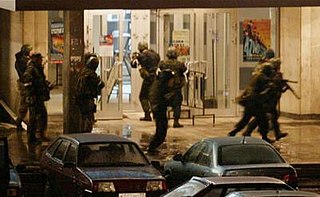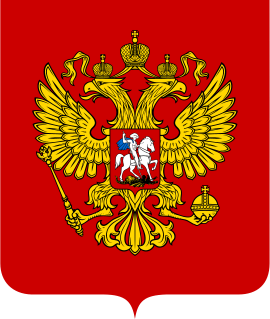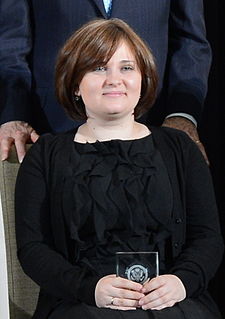Related Research Articles

Chechnya, officially the Chechen Republic, is a constituent republic of Russia situated in the North Caucasus in Eastern Europe, close to the Caspian Sea. The republic forms a part of Russia's North Caucasian Federal District, and shares land borders with the country of Georgia to its south; with the Russian republics of Dagestan, Ingushetia, and North Ossetia-Alania to its east, north, and west; and with Stavropol Krai to its northwest.

The Moscow theater hostage crisis was the seizure of the crowded Dubrovka Theater by 40 to 50 armed Chechen terrorists on 23 October 2002, which involved 850 hostages and ended with the death of at least 170 people. The attackers, led by Movsar Barayev, claimed allegiance to the Islamist separatist movement in Chechnya. They demanded the withdrawal of Russian forces from Chechnya and an end to the Second Chechen War.

The Second Chechen War was an armed conflict in Chechnya and the border regions of the North Caucasus between the Russian Federation and the Chechen Republic of Ichkeria, fought from August 1999 to April 2009.

Shamil Salmanovich Basayev also known by his kunya "Abu Idris", was a senior leader of the Chechen independence movement.

Ramzan Akhmadovich Kadyrov is a Chechen politician currently serving as the Head of the Chechen Republic. He was formerly a member of the Chechen independence movement.

As a successor to the Soviet Union, the Russian Federation remains bound by such human rights instruments as the International Covenant on Civil and Political Rights and International Covenant on Economic, Social and Cultural Rights (fully). In the late 1990s, Russia also ratified the European Convention on Human Rights and from 1998 onwards the European Court of Human Rights in Strasbourg became a last court of appeal for Russian citizens from their national system of justice. According to Chapter 1, Article 15 of the Constitution adopted in Russia in December 1993, these embodiments of international law take precedence over national federal legislation. However, from Vladimir Putin's second term as President (2004–2008) onward there were increasing reports of human rights violations.

Novaya Gazeta is a Russian sociopolitical newspaper known in its country for its critical and investigative coverage of Russian political and social affairs.

Anna Stepanovna Politkovskaya was a US-born Russian journalist, writer, and human rights activist who reported on political events in Russia, in particular, the Second Chechen War (1999–2005).

Lesbian, gay, bisexual, and transgender (LGBT) people in Russia face legal and social challenges not experienced by non-LGBT. Although sexual activity between same - sex couples has been legal since 1993; homosexuality is disapproved of by most Russians, and same-sex couples and households headed by same-sex couples are ineligible for the legal protections available to opposite-sex couples. There are currently no separate laws prohibiting discrimination based on sexual orientation in Russia. Transgender people are allowed to change their legal gender following sex reassignment surgery; however, there are currently no laws prohibiting discrimination based on gender identity or expression, and recent laws could discriminate against transgender residents. Homosexuality has been declassified as a mental illness and although gay and lesbian individuals are legally not allowed to serve openly in the military, there is a de facto policy.
Nina Yefimova was a reporter for Vozrozhdeniye ("Revival"), a local Russian language newspaper in the Chechen capital Grozny. She was the 18th journalist to be killed in Chechnya since fighting escalated in December 1994.
Since the start of the Second Chechen War in 1999, Russian federal authorities are alleged to have implemented a plan to use legal and extralegal methods to limit media access to the conflict region.

Thomas Patrick Lowndes de Waal is a British journalist and writer on the Caucasus. He is best known for his 2003 book Black Garden: Armenia and Azerbaijan Through Peace and War.
Iskandar Khatloni was a journalist from Tajikistan who worked for Radio Free Europe and was murdered in Moscow, Russia while covering the Second Chechen War.
Krystyna Kurczab-Redlich is a Polish journalist and author.

Elena Milashina is a Russian investigative journalist for Novaya Gazeta. In October 2009, she was awarded Human Rights Watch's Alison Des Forges Award for Extraordinary Activism.
Musa Muradov is an ethnic Chechen Russian journalist. In 2003, he was awarded the International Press Freedom Award of the Committee to Protect Journalists for his reporting on the Second Chechen War.

The Chechen–Russian conflict refers to various conflicts between the Russian government and various Chechen forces.
Anti-Chechen sentiment or Chechenophobia, Nokhchophobia and Anti-Chechenism refers to fear, dislike, hostility, and racism towards ethnic Chechens and anything related to Chechen culture and North Caucasian culture in general. Anti-Chechen sentiment has been historically strong in Russia, and, for some part, spread to the other countries such as former Soviet Union like Azerbaijan, Armenia, to Europe, Middle East (Syria) to further United States. The main causes of hatred against Chechens for decades have been largely due to Russian anti-Chechen propaganda, Chechen involvement in global Islamic terrorism and adherence of Chechens to Islam.
Patryk Zaucha is a Polish footballer who plays as a defender for Cracovia.
References
- ↑ "Pole Badly Beaten for Not Yielding to Car". The Moscow Times . 26 May 2009. Retrieved 26 May 2010.
- ↑ "Chechnya's deadly black widows". New Statesman . 6 September 2004. Retrieved 26 May 2010.